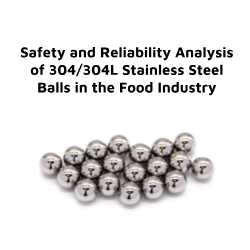
 Home > News
Home > NewsIn the food industry, equipment and materials must meet stringent safety and hygiene standards to ensure product quality and consumer safety. Among the various materials used, 304/304L stainless steel balls are widely employed in food processing machinery, conveyors, mixers, and other equipment. Their application in this sector is driven by their safety, corrosion resistance, and mechanical properties. This article explores the safety and reliability aspects of 304/304L stainless steel balls in food-related applications.

One of the critical concerns in food processing is corrosion, as it can lead to contamination of food products. 304 and 304L stainless steel are particularly suitable due to their high chromium and nickel content, which form a passive oxide layer on the surface, preventing corrosion. This is essential in environments where equipment comes into contact with moisture, food acids, and cleaning chemicals.
The low carbon content in 304L further enhances corrosion resistance by reducing the risk of intergranular corrosion, particularly in welds and heat-affected zones, which are common in food processing machinery. These properties make 304/304L stainless steel balls a hygienic choice for food contact applications.
304/304L stainless steel is non-reactive with most food products, making it a safe material in environments with diverse food types. The material does not leach harmful substances into food, which is essential for maintaining food quality and safety. This non-reactive nature ensures that the taste, smell, or appearance of the food is not altered, a critical requirement in high-standard food processing environments.
In food processing, machinery is often subject to high loads and rigorous mechanical demands. 304/304L stainless steel balls offer excellent mechanical strength, with the ability to withstand the stresses involved in grinding, mixing, and conveying operations. Their high tensile strength and resistance to wear ensure long-term durability, reducing the need for frequent replacement and minimizing downtime. This contributes to the reliability of the equipment in which they are used.
Many food processing applications involve high temperatures, particularly during sterilization and cooking. 304/304L stainless steel can withstand temperatures of up to 870°C (1600°F) without losing structural integrity. This makes it suitable for use in equipment exposed to high-temperature conditions, ensuring reliability even in extreme environments.
A significant aspect of food safety is the ability to maintain cleanliness and reduce the risk of bacterial contamination. 304/304L stainless steel has a smooth, non-porous surface that is easy to clean and sanitize. Its resistance to harsh cleaning chemicals, such as caustic solutions and chlorine-based disinfectants, ensures that the material remains effective over time. This ease of maintenance enhances the safety and hygiene of food processing equipment, contributing to overall food safety standards.
304/304L stainless steel meets international standards for food safety, including those set by the Food and Drug Administration (FDA) and the European Union. These standards regulate the materials that can come into contact with food, ensuring that they do not pose a risk to human health. By using 304/304L stainless steel balls, manufacturers can be confident that their equipment complies with these regulations, thus safeguarding consumer health.
The long-term reliability of 304/304L stainless steel balls also translates into cost-effectiveness. Their durability reduces maintenance costs and the need for frequent replacements, making them a cost-efficient choice for food industry applications. Additionally, stainless steel is recyclable, supporting the sustainability goals of modern food processing companies.
304/304L stainless steel balls offer an ideal combination of safety, reliability, and durability for use in the food industry. Their corrosion resistance, non-reactivity, mechanical strength, and compliance with safety standards make them a trusted material in food processing equipment. With a focus on hygiene, long-term performance, and regulatory compliance, these stainless steel balls contribute to maintaining the highest standards of food safety and quality.
View More(Total0)Comment Lists